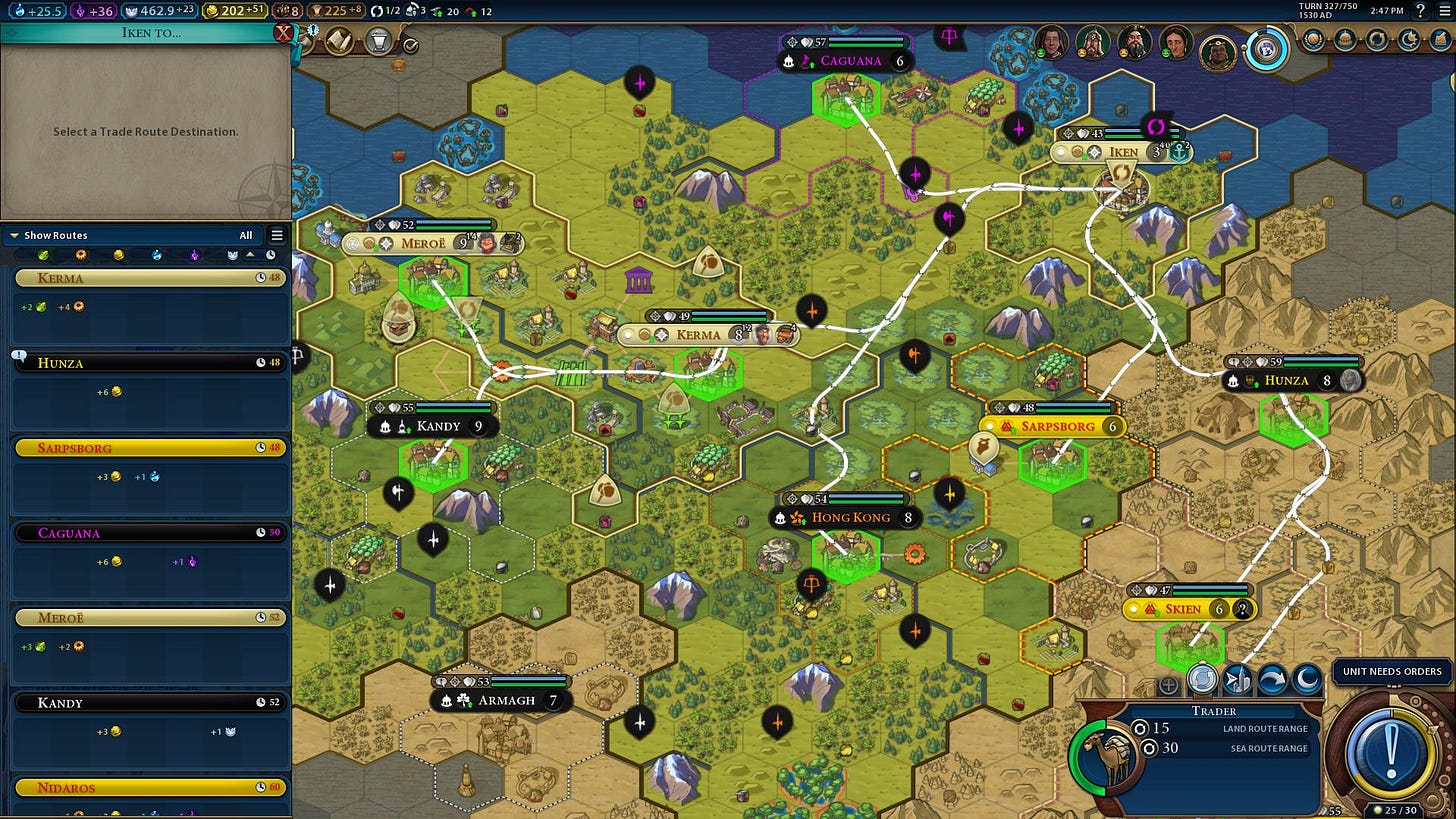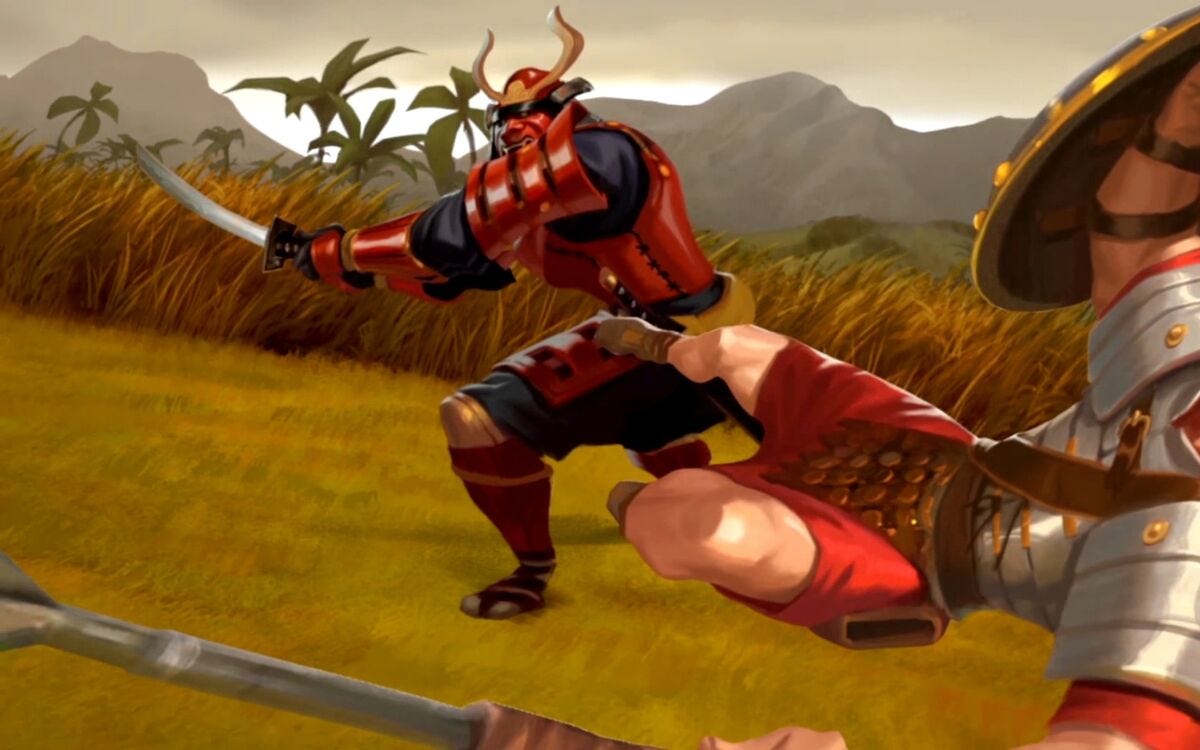On Towards the Stars: Executing a Domination Victory
[This post is part of a larger strategy guide for Civilization 6]
If science is the default victory condition, then military dominance is the most "proactive" victory condition. You can't stumble your way into a military win. You need to actively make the choice to go for war at every step.
And generally that choice is a costly one.
Military victories are hard to win because they fly in the face of the ramp/war trade off. Even civs that are all about military victories end up pivoting to some other victory condition closer to the end game. When someone does pull off a conquest win, it happens in one or two big sweeps — a wave of non-stop war that rolls over opponents, crippling them so hard that they cannot come back into the game at all, followed by a rebuild/rearm period to do it again to the next victim.
When to choose military
Ironically, the biggest factor in deciding when to go for a military win is simply how many people are playing. Military victories get significantly harder for each additional player in the game. More players means you have to eventually capture more capitals, which means fighting off more players or bigger players that have already consumed their neighbors. And that means time. Science, culture, and Diplo victories are all on a roughly fixed clock. Military and religion scale with the number of players. You might have the strongest military in the game, but it doesn't matter if your opponents can get to space before you can even physically reach their capital.
This cuts both ways. Military victories are hard with 8 players, but pretty damn easy with 4.
Civs that generally do well with military victories are those that can offset the cost of building and maintaining units. Either the units are cheaper, or are stronger for the same price, or you get some other bonus to production that lets you keep ramping even as you conquer. Zulu is probably the gold standard, their early impi corps are ridiculously strong. But other good civs include Macedon, Mongolia, Gran Colombia, Turkey, Aztec, and Hungary.
Money makes the world go round
If you go for a lot of domination victories, you learn pretty quickly that it becomes a lot harder to justify spending production on units as the game goes on. Producing units takes up critical time for buildings, districts, trade routes, and other things that help your ramp. As a military-focused player you are by nature incentivized to spend more time building units than everyone else; as a result, you have to be much more careful to avoid spending too much time building units at the expense of more useful things.
You can, of course, offset some of the production cost with cards. Intelligently using 50% production boost cards, for example, will help you quickly stand an army up. But, generally speaking, the best way to maintain a modern, strong army is to build an army in the ancient era and then upgrade it. There are a few reasons why this is beneficial.
Units are often significantly cheaper to build in the ancient era than they are in any other era, especially when compared to alternatives. Warriors and slingers are relatively cheap compared to equivalents in later eras, and they have no maintenance cost.
The opportunity cost of building ancient era units is pretty low. In the late game you likely have many districts that all require unique buildings that need to be built. In the early game, you may only have one, and you may not even have the pop required to benefit from builders that can improve tiles.
Units that stay around for a while tend to have more promotions, which means they are pound for pound stronger when upgraded than the same units built new.
Upgrading allows you to get rid of earlier era units that may be costing maintenance but aren't strong enough to be worthwhile in battle, while 'getting back' some of the initial production cost in the form of not having to create units from scratch. It's a pretty good trade, especially with the 50% coin/resource discount cards unlocked with the Mercenaries civic.
The games where I have won on domination were those where I pumped out a bunch of early units using a combination of God of the Forge1 and Agoge2, and then kept upgrading them over the game. At each upgrade I would try and run a timing push on a neighboring city. By the Renaissance era, I would end up with a really well promoted military without being that far behind in ramp potential (and often I would be ahead thanks to the cities I took over).
This does mean, though, that your military has to actually survive in war. And that in turn means that you have to get pretty damn good at tactics. Every unit that is killed is more production you have to spend on a replacement. And that production cost simply gets higher and higher as the game goes on. It's another fantastic example of the beauty of Civ's game design. The best generals on the battlefield are also those most well equipped to win a military victory.
Upgrading units also means that you have to invest in a good domestic economy. You'll need money anyway to maintain your troops without going bankrupt, but if you're at war with everyone you won't be able to use any international trade routes. And if you're playing a game without AI, you can't rely on lopsided trade deals where an AI gives you 20 gold per turn for an orange. All of that in turn means that you might find yourself money starved through the game. There are some great people that make this easier (Raja Todar Mal in particular), but you can't really rely on that. Build commercial hubs, you'll need em.
The last caveat to focusing so much on exclusively upgrading units: planes. You can spend the whole game upgrading your army, but if you don't have any industrial base you will hit a wall when you research planes. There is no way to upgrade into them, so you have to build or buy every plane from scratch. Planes totally change the nature of war. For the majority of the game, you want to be thinking about which units are in the line of fire, which units have support or flanking bonuses, how to protect siege while getting them into position, etc. etc. By the modern era, battles are won by whoever has more planes. Make sure it's you!
24 Hour Burger King
A not-quite-incorrect meme is that wars are won by logistics and information much more than they are won by man-power or rockets. The reason the US military is so scary isn't because of its nuclear arsenal or its crazy drone tech. It's because it can drop a fully functioning Burger King anywhere in the world within 24 hours.
The same is roughly true in Civ. Yes, you need to have a lot of upgraded units, a tank will always beat a swordsman, that's table stakes. But between two competent players, wars will be decided by timing and by supply lines. You need to know when your opponent is low on military or behind in technology, either through spies, religious units, or open borders. You need to set up infrastructure — forward encampments, offensive trade routes, even the rare fort — so that you can get units to where they need to be and maintain tempo.

I've won wars because I chopped down every tree between my capital and the city I wanted to capture, and my opponent didn't think to do so. Even though both of our capital cities were the same distance away, it took him twice as long to get reinforcements over. By that point, I'd already captured the city. And I've lost wars because I didn't notice that my opponent was far enough ahead of me on tech that he could quickly upgrade and neutralize a push, or because I didn't notice a key city-state suzerain that ended up opening another front that I had to defend against, or because I didn't see that he'd grabbed the great person that lets you automatically build walls.
Military players need to know what is happening in the game way more than anyone else, and need to be ready to react at the right time. Fortune favors the prepared.
Military pivot
Even though most of this section is about winning a domination victory, in practice that's rarely the best move. It's much more common that a dominance-focused player starts with a military play and, after knocking out one or two neighboring civs, pivots to culture or science. This is especially true if you manage to take enough high quality cities that you offset any cost paid to build and maintain a military. War is a gamble — you are hoping that the amount you get out of war is more than the amount you invested in building a military to win. If you built 3 swordsmen to take a city that has 4 districts and a bunch of improved tiles, your gamble paid off, and you're now way ahead of everyone else. But this is also why war is so risky. If you lose a war, you end up behind everyone else. So if you're already far ahead, it may make sense to switch to a more guaranteed win condition instead of taking more risks. Some civs — Persia, Arabia — are explicitly set up for this kind of pivot. I give an example of this kind of pivot here.
Common mistakes
The most common mistake a dominance-focused player will make is over extending. Defense is always easier than offense. Unless you have a fantastic industrial base and strong commercial economy, you will eventually reach a point where your units are simply not going to be able to take the next city. Either they have stronger units, or they have walls that you can't break, or they're in a better logistics position, or they can out produce you. You have to know when that happens before it happens, and ideally before your opponent knows its about to happen, so you can quit while you're ahead and walk away with whatever cities you managed to conquer.
The worst thing you can do is spend your entire empire's resources — every city producing units, all your cards focused on combat — just to throw your army into the meat grinder for a tier 2 or tier 3 city. Even if you manage to take it, you likely won't be able to hold it once your opponent comes back.
Declaring peace doesn't mean giving up on war forever. It means regrouping, building up your military again (now with the help of a few more cities that you took over), and waiting for the right time to restart the attack.
Once players figure out how to properly wage war, they become a threat. And then they run right into the second most common mistake: pissing everyone else in the game off. At the higest levels, Civ is a game of diplomacy as much as anything else. Players can and will work together to take down whoever is in first. So if you're going for a dominance victory, you want to pretend as long as possible that you are doing anything else. Declare friends with people. Look for 'causus bellis' — someone forward settled you, or killed your religion. Get other people to declare war on you due to a forward settle. Declare joint wars so that you and an "ally" can split up someone else's land.

Some of the suspicion can't be helped. If you're playing Shaka, everyone will be on their guard. So look to play people off each other, offering your military 'services' behind the scenes. When you have a strong enough military that you can win outright, declare war on everyone who's left and sweep.
Stopping Domination: Alliances
Not literal in-game alliances, though those are often useful. I mean verbal agreements. Anyone going for dominance victory has to eventually fight everyone else — that's just a tautological requirement, brought on by the need to take each capitol city. So the best way to stop a dominance player is to stop fighting each other and unite against the common threat. The sooner the better3.
Sometimes, this requires some sacrifice beyond just contributing military units. If there's a player that's starting to really steam roll military victories, and you're far away from them, you may need to bolster closer neighbors with gold or strategic resources. More generally, if you believe someone else is a threat to everyone, you need to incentivize the other players to stop them. Otherwise, players who are closest to the dominance player may not want to go to war themselves — if they waste a bunch of time attacking their neighbor just to stop a potential dominance victory, both civs may just end up crab bucketing each other while everyone else goes on to win.
This speaks to the most common reason a dominance player ends up steamrolling: the rest of the table just couldn't put aside their differences.
Stopping Domination: Grind em down
It's unlikely that any one player will be so dominant that they will sweep the entire world in one shot. If you get caught with your pants down on a timing push, that definitely sucks, but it's not the end of the world — you have time and logistics on your side. Your goal should be to delay as much as possible while unlocking the next tier of units so you can increase the strength and damage output of your walls. I've written about this pretty extensively here.
In general, you want to take advantage of the fact that your opponent has burned a bunch of time building units. While they were arming themselves, you ideally pushed ahead on science and culture. And that in turn should mean that you have access to better units faster. There's no doubt about it, defending in a war sucks. But if you can stop an invasion in its tracks — and neutralize an enemy army without them getting any of your cities — the invader is basically out of the game. It is very hard to recover from spending all of that production building an army that didn't result in any meaningful return on investment. And that in turn means you can counter attack them later on.
Concluding Thoughts
Civ is a game that really rewards playing wide, so getting a lot of cities with even one or two districts can really give you an advantage. Every city you take is one that your opponent no longer has. I think every multiplayer game I've ever played devolves into some amount of war eventually. And if there aren't that many players, those wars will end in a game over screen one way or another. But I can't stress enough how much a dominance play is really dependent on having a small number of players close together. Trying to sweep against 6+ competent players spread over a large map is just a tough time, and there's no shame in taking advantage of your civ's military bonuses in the relevant era only to pivot later on.
30% production increase to ancient and classical era units.
50% production increase to ancient melee and ranged units.
Now, uniting the table against an enemy does require a bit of wisdom and insight. A good dominance player may try and pretend that someone else is going for dominance, in order to justify attacking that person.




